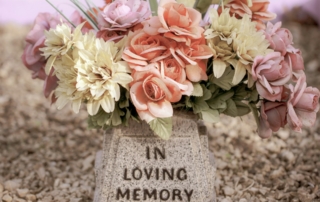Articles
Understanding and Overcoming Nighttime Anxiety
You may often hear people comment on whether they are (or aren’t) morning or evening people. Some people function better, and they are more creative and personable at certain times of the day. To handle the rigors of operating at a time that isn’t ideal for them, some people drink coffee to rouse themselves, others exercise, and others meditate over Scripture and pray to feel energized and in the right frame of mind. There’s another sense in which times of the day can affect a person. For some people, the approach of a new day feels overwhelming, while other people can [...]
Working Through the Grief Process: Tips from a Christian Counselor
If you get turned around while in the woods or a strange part of the city, one of your top priorities is to find the quickest way home. You want to know and have the safety of knowing that there is a clear path to get where you need to be. Not all of life works like this, even when we want it to. There are many situations where the way home, so to speak, is along a winding road with many unknown twists and turns. When you lose a loved one, that can be one of the most disorienting experiences [...]
5 Places to Get the Support You Need
Every person needs support in life. Even the most independent, strong person needs support occasionally. This may be financial support when a job has been lost, emotional support during a health crisis, prayer support when families are struggling, or food and shelter if finances are in dire need. Sometimes, if people are struggling with an issue that they can’t resolve, they may need mental health support. Whatever the type of support, a person must have resources at their fingertips to access the resources they need when they need them. In the United States, we live in a highly individualized culture. During [...]
Understanding Mindful Self-Compassion
Mindfulness is about intentionally and purposefully centering your attention on whatever is happening in the present moment and accepting your thoughts, feelings, and physical sensations without judging yourself for characteristics you dislike or for not meeting your expectations. It is related to self-compassion. The way you treat your own heart is the way you will end up treating everyone else’s. – John Eldredge What is self-compassion? Self-compassion is about being less critical and more accepting of yourself and your imperfections. It is about treating yourself kindly instead of harshly in moments of perceived failure, recognizing that messing up or making mistakes [...]
Losing Yourself: What Does It Mean to Be Codependent?
The word codependency has had many definitions throughout the years. The term was coined in the 1970s to describe a person whose life was directly affected by someone who struggled with chemical dependency; it described a person who had an unhealthy way of coping with life in response to someone else’s use of alcohol or drugs (Beattie, 2022). Yet, the most recent definition encompasses a broader range of characteristics and behaviors. Today, codependency can be defined as a relationship dynamic in which a person becomes overly reliant on another for their emotional and psychological well-being, and it may manifest itself as [...]
Marriage and Our Phones: The Impact of Technology on Relationships
It’s no surprise that screen usage has enraptured our current generation. From the elderly learning how to navigate Facebook Marketplace to toddlers navigating YouTube Kids, the spectrum of screen usage is wide. In general, the conversation about the negative effects of screen usage is ongoing, but I would like to suggest that we consider the negative effects of screen usage in marriages. Are our phones our second spouse? For most of us, our phones are incredibly helpful. They help us stay connected with family, friends, and even our spouse. Phones, in and of themselves, are not the enemy. But there is [...]
What are the Different Types of Boundaries and How Do I Implement Them?
What exactly is a boundary, and why are they important? A boundary is a spoken or written representation of a limit or restriction one imposes on others. A person conceptualizes a boundary based on their internal feelings based on lived experiences. For example, if a person does not like loud noises because of their childhood experiences, that person can tell people around him or her to speak more softly. While boundaries play a crucial role in relationships, society frequently misappropriates them or weaponizes them for selfish reasons. This is mainly demonstrated in the form of a person implementing a boundary and [...]
What is the Source of Worry? Does Constant Worrying Mean Something is Wrong?
What is the source of worry? Does worrying constantly mean something is wrong? The human brain is immensely complex, making it difficult to understand and interpret all its unique functions. First, let’s consider the physiological and psychological aspects of worrying. Physiological Aspects of Worrying The brain has two primary systems that take in information and decipher it throughout the body. These systems are the peripheral and central nervous systems, but the central nervous system is responsible for receiving information that can potentially harm us. Environmental experiences (i.e., being startled, anxious, etc.) are first relayed through the thalamus to the hypothalamus of [...]
Stress Management Tips for the Working (and Stressed) Mom
Chronic stress can be a killer. Stress contributes to sleepless nights, depression, anxiety, weight gain or loss, mood swings, irritability, high blood pressure, and rapid heart rate. It can also result in physical conditions, such as heart attack, stroke, and Type II diabetes. As a working mother, whether outside the home or remotely, most responsibilities, if not all, fall on your shoulders. You know what needs to be done, and you do it, but are you short-changing yourself? Are you stretched too thin? These stress management tips can help you balance the fine line between Supermom and the woman within. Stress [...]










